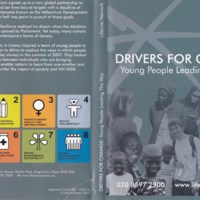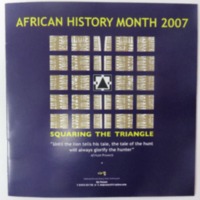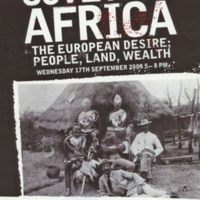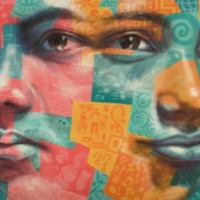
Drivers for Change: Young People Leading the Way
Drivers for Change was a project led by LifeLine Network, a network of partnerships between community organisations and NGOs with a common aim to fight poverty. In Summer 2007, a team of young people visited Zimbabwe, Sierra Leone and Dominica to explore the ways in which people were combating modern slavery. The trip was inspired by two significant points in history: the 1807 Abolition Act, and the half way point of the Millennium Development Goals, for which 189 nations signed up to a new global partnership to reduce extreme poverty. While in Africa, the group looked at how global partnerships between individuals bring communities together, and assist in countering the impact of poverty and HIV/AIDS. A film was produced documenting the trip, launched at an event was held at the Palace of Westminster.

African History Month 2007: Squaring the Triangle
Squaring the Triangle was the theme of African History Month 2007 in Suffolk. The programme was co-ordinated by the Nia Project (a cultural, arts and heritage project) and explored the history and legacy of slavery through film, literature, exhibition, music and debate. The theme of Squaring the Triangle was underpinned by the African proverb, ‘Until the Lion tells his tale the tale of the hunt will always glorify the hunter’. Highlights included the Nia Memorial Lecture, given by the producer-director Pam Solomon-Fraser. Nubian Films short season looked at the current legacy of slavery and the Diaspora of African peoples. Talks, workshops and debates covered issues such as reparations, retribution, resistance, and educational guidelines for parents on how to discuss the African slave trade with children. Special recognition was given in the programme to Ghana’s 50th anniversary as an independent state. There were heritage walks around Ipswich to uncover some of the cultural connections with Africa, the Caribbean and Suffolk. A Youth Day Conference hosted by the Zimbabwe Youth brought together young people from the community to use music and poetry to explore their ideas on the legacy of the slave trade. Historian Maureen James and representatives from Suffolk County Council led pupils from local schools in researching the anti-slavery movements, with particular reference to the Clarkson family.

Coveting Africa. The European Desire: People, Land, Wealth
Bishop’s Stortford was the birthplace of the Victorian financier and imperialist Cecil Rhodes. To commemorate the bicentenary of the Abolition Act, Bishop's Stortford Museum and Rhodes Art Complex explored Britain’s imperial ambitions in the ‘Coveting Africa’ exhibition. The museum holds much material from Southern Africa, Zimbabwe, Zambia and Botswana: areas where British colonialism and imperialism in Africa was focused in the nineteenth century. Through a year-long programme of arts events, this project discussed the relationship between Britain and Africa, and explored British attitudes to African peoples. Events included workshops by the London School of Capoeira.

Faith
Faith was taken from her home country of Zimbabwe into South Africa in 2004. Like many young Zimbabwean women, she was trafficked through the false promise of employment. Other Zimbabwean women are tricked into slavery through promises of marriage and education, and some are simply abducted. Zimbabwean women are also forced into prostitution in the UK, the US and South East Asia, and some are trafficked internally from rural to urban areas for forced domestic labor. High levels of poverty and unemployment are factors in Zimbabwe’s trafficking problem, and the low status of women in Zimbabwean society perpetuates gender violence. The situation worsened after 2005, when the Zimbabwean government began Operation Murambatsvina (“Operation Clean-Up”), a campaign to forcibly clear slum areas. This displaced hundreds of thousands of people, and left an estimated 223,000 children vulnerable to trafficking. In South Africa, where Faith was still in slavery as she narrated her story, the number of trafficking victims remains unknown but the International Organization for Migration reports that trafficked women and children arrive from the Democratic Republic of the Congo, Malawi, Mozambique and Zambia (trafficked through Zimbabwe), and that several major criminal groups in South Africa now traffic women: Bulgarian and Thai syndicates, the Russian and the Chinese Mafi, and African criminal organizations, mainly from West Africa.